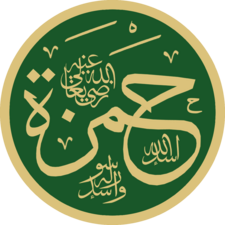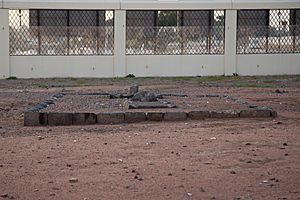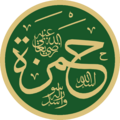Hamza ibn Abdul-Muttalib facts for kids
Quick facts for kids
Lion of God (أسد الله)
Lion of his Messenger (وأسد رسوله) Master of the Martyrsʾ (سيد الشهداء) Ḥamza
حَمْزَة |
|
|---|---|

His Name in Islamic calligraphy
|
|
| Military Commander to Muhammad | |
| In office 623–625 |
|
| Succeeded by | Zubayr ibn al-Awwam |
| Personal details | |
| Born | c. 568 (53 BH) Mecca, Hejaz, Arabia |
| Died | 23 March 625 (7 Shawwal, 3 AH) (aged 56–57) Mount Uhud, Medina, Arabia |
| Resting place | Uhud, Medina |
| Spouses |
|
| Relations | |
| Children |
|
| Parents |
|
| Occupation | Military general |
| Known for | Paternal Uncle and Companion of the Prophet |
| Tribe | Quraysh (Banu Hashim) |
| Religion | Islam |
| Military service | |
| Allegiance | Muhammad (623–625) |
| Years of service | 623–625 |
| Rank | Military Commander |
| Battles/wars |
|
Hamza ibn Abd al-Muttalib (Arabic: حَمْزَة بْن عَبْد ٱلْمُطَّلِب; born around 568 CE – died 625 CE) was a very important person in early Islam. He was the paternal uncle of the Islamic prophet Muhammad. He was also a foster brother and a close companion of Muhammad.
Hamza was known by special names. People called him Asad Allah (أَسَد ٱللَّٰه), which means "Lion of God." He was also called "Lion of his Messenger." After his death, Muhammad gave him the title Sayyid al-Shuhada (سيد الشهداء), meaning "Chief of the Martyrs." He died as a martyr in the Battle of Uhud in 625 CE.
Contents
Hamza's Early Life
Hamza was born in Mecca, a city in Arabia. He was born just a few years before Prophet Muhammad. Some say he was two to four years older than Muhammad. They even shared the same wet nurse, Thuwayba, who also nursed Muhammad.
Hamza was a very strong and brave person. He was known for his skills in wrestling, archery, and fighting. He also loved hunting lions. People in Mecca described him as "the strongest man of the Quraysh" tribe.
His Family
Parents and Relatives
Hamza's father was Abd al-Muttalib, a respected leader from the Quraysh tribe in Mecca. His mother was Hala bint Wuhayb. Interestingly, Hamza's father, Abd al-Muttalib, and Muhammad's father, Abdullah, got married on the same day. This made Hamza the younger brother of Muhammad's father.
His Children
Hamza was married three times and had several children. His children included Umama, Amir, and Bakr.
Becoming a Muslim
For the first few years, Hamza did not pay much attention to the new religion of Islam. But that changed in 616 CE. One day, after a hunting trip, he heard that a man named Amr ibn Hisham (also known as "Abu Jahl") had insulted Prophet Muhammad. Abu Jahl had spoken badly about Islam and tried to make Muhammad look bad.
Hamza became very angry. He went to the Kaaba, a holy building in Mecca, where Abu Jahl was sitting with other leaders. Hamza stood over Abu Jahl and hit him hard with his bow. He then bravely declared, "Will you insult him, when I am of his religion and say what he says? Hit me back if you can!"
After this event, Hamza officially became a Muslim. His decision to accept Islam was a big moment. The Quraysh tribe realized that Muhammad now had a strong protector in Hamza. This made them less likely to bother Muhammad.
Hamza was very devoted to his new faith. He once asked Muhammad to show him the angel Jibreel in his true form. Muhammad warned him it would be difficult to see, but Hamza insisted. It is said that Jibreel appeared, and Hamza was so overwhelmed that he fainted.
In 622 CE, Hamza joined the emigration to Medina. This was when Muslims moved from Mecca to Medina to escape persecution. In Medina, Muhammad made Hamza the "brother in Islam" of Zayd ibn Haritha, a close companion.
Military Actions
First Expedition
Muhammad chose Hamza to lead the very first military mission against the Quraysh. Hamza led thirty riders to the coast to stop a trading caravan. They met Abu Jahl and his three hundred riders. However, a local leader named Majdi ibn Amr al-Juhani stepped in and prevented any fighting.
Battle of Badr
Hamza played a heroic role in the Battle of Badr, a major battle in early Islam. He was easy to spot because he wore a special ostrich feather. In this battle, Hamza fought bravely. He killed Al-Aaswad ibn Abdalasad al-Makhzumi. He also defeated Utba ibn Rabi'a in a one-on-one fight and helped Ali defeat Utba's brother.
After Badr, Hamza also carried Muhammad's flag in an expedition against the Banu Qaynuqa tribe.
His Death

Hamza became a martyr in the Battle of Uhud on March 23, 625 CE. He was fighting bravely in front of Muhammad with two swords. During the battle, a slave named Wahshi ibn Harb, who was a skilled javelin thrower, attacked Hamza. Wahshi had been promised his freedom by Hind bint Utba if he killed Hamza. Hind wanted revenge because Hamza had killed her father in the Battle of Badr.
Hamza stumbled and fell, and Wahshi threw his javelin, hitting Hamza and causing his death. Hamza was about 57 to 59 years old when he died.
Hamza was buried in the same grave as his nephew Abdullah ibn Jahsh. Muhammad later spoke highly of Hamza, saying that angels washed him because he was in Paradise. Fatima, Muhammad's daughter, often visited Hamza's grave to honor him.
Images for kids
See also
 In Spanish: Hamza ibn Abdul-Muttalib para niños
In Spanish: Hamza ibn Abdul-Muttalib para niños


